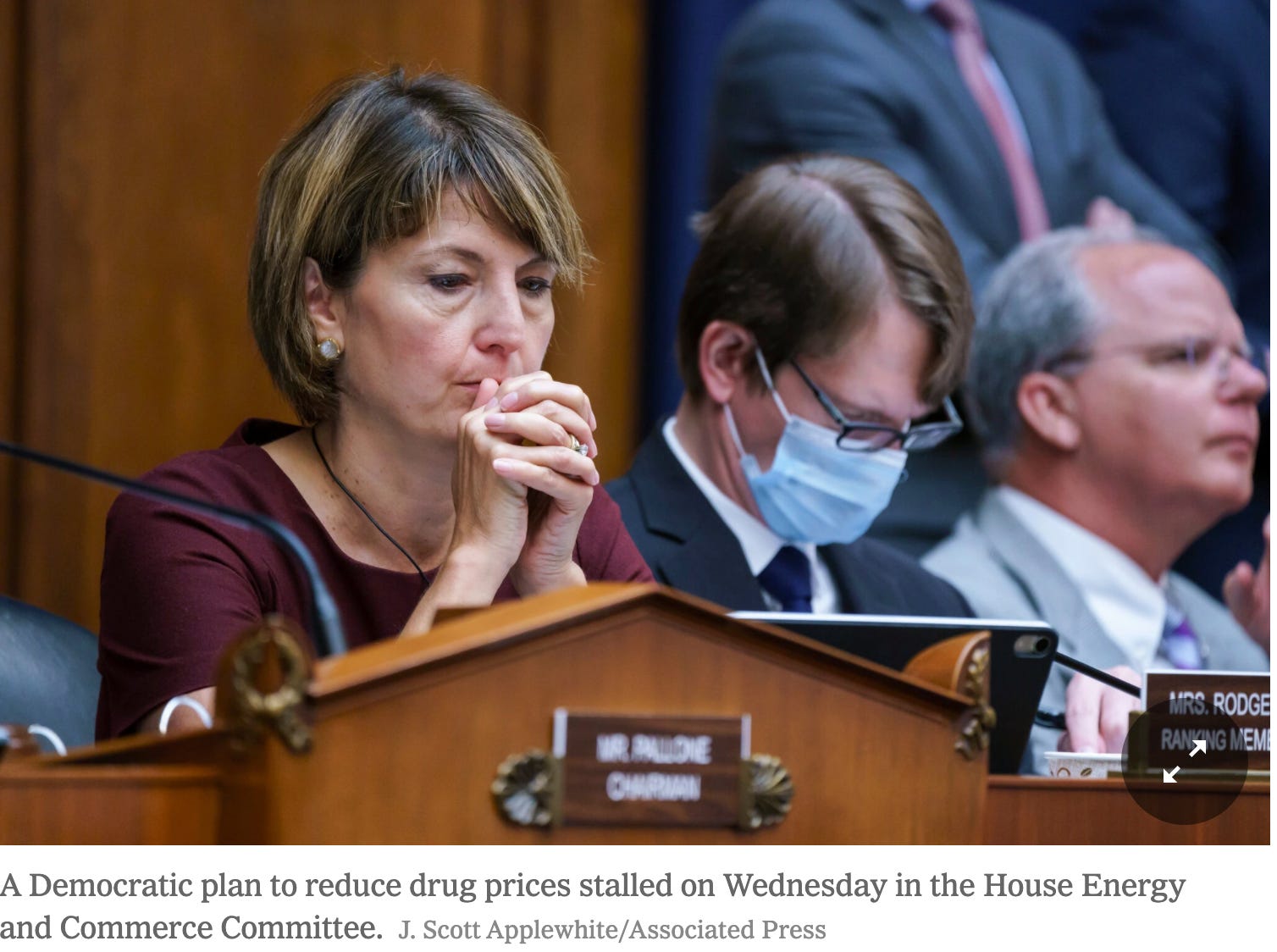Enchanted by the drug industry and an imagined free market
“Democrats’ Stumble on Drug Prices Shows Power of Industry” was a headline in the New York Times on September 15. Ironically, the photo at the top of the article featured featured our very own Cathy McMorris Rodgers (U.S. Rep, Congressional District 5, Eastern Washington):

The article focuses on three Democratic members of the House Energy and Commerce Committee (or a sub-committee of that committee—the article is unclear) who voted against a proposal to rein in drug prices paid by Americans. They were Representatives Scott Peters of California, Kurt Schrader of Oregon and Kathleen Rice of New York.
According to the article:
The United States pays higher prices for prescription drugs than any of its peers — about 250 percent of the price paid on average by other Organization for Economic Cooperation and Development countries, according to a recent report from the RAND Corporation. And those high costs ripple through the federal budget and the economy, increasing insurance premiums, and putting lifesaving medications out of reach for some patients.
Every American knows that ridiculous drug pricing is a major problem; a problem that was exacerbated when, in the lead up to passage of the Affordable Care Act ten years ago, the pharmaceutical lobby managed to induce legislators to strip from the measure the ability of Medicare to negotiate with drug companies on the basis of price. On September 15, the three Democratic committee members featured in the article voted “Nay” on measures which would have put forward into the 3.5 trillion dollar infrastructure bill drug expense savings of at least 500 billion dollars.
McMorris Rodgers is the ranking (senior) member of the minority party (Republican) of the full House Energy and Commerce Committee. That also makes her an ex officio member of all the subcommittees of Energy and Commerce. McMorris Rodgers has voted against virtually all efforts to rein in drug prices for years. A statement on her website:
What we do know is, if H.R. 3 becomes law, we’d lose hope to cure cancer or treat genetic conditions. Instead of price controls, we should focus on the areas for bipartisan work.
H.R.3 is the “Elijah E. Cummings Lower Drug Costs Now Act”. McMorris Rodgers’ statement is the major talking point of the pharmaceutical industry, that paying (inflated) prices for drugs through Medicare and patients’ pocket is necessary to fuel pharmaceutical innovation. This is a talking point that totally ignores the exorbitant paychecks of pharmaceutical company executives and the drug company profits paid out to investors. Of course, the talking point is precisely in line with the Republican slavish fealty to the “free market” in health care—a complete illusion. A few years ago McMorris Rodgers claimed to be working very, very hard to rein in drug pricing (and helping preserve small pharmacies) with a bill that would trim the power of Pharmacy Benefit Managers—a tack of dubious value that never went anywhere. McMorris Rodgers was unable to move that bill or its successor in spite of the relatively prominent position she held for six years as Chair of the House Republican Conference (replaced by Liz Cheney—herself now also replaced).
It is ironic that McMorris Rodgers’ drawn face appears at the top of this New York Times article, an article in which McMorris Rodgers is not mentioned by name. Instead, the article focuses on the three Democratic defectors presumably taken in by the same well-funded arguments of lobbyists for the drug companies that already dominate the minds of every Republican on the committee, every one of whom voted “Nay” on September 15. The New York Times writers are focused on the short term while ignoring the need to vote these Republicans out of office if any progress is to be made with any of this.
In eastern Washington we need to focus not on the defector Democrats but on the block of Republican Representatives, including our own McMorris Rodgers, who are enthralled by the rhetoric of the pharmaceutical industry.
Keep to the high ground,
Jerry